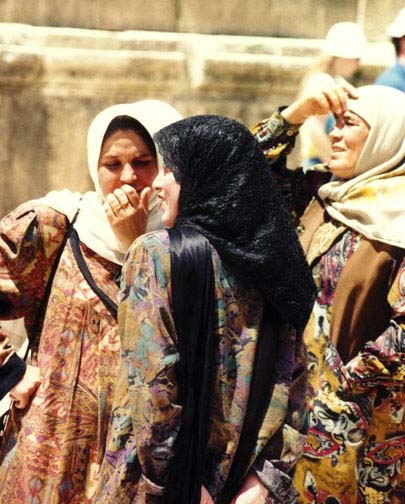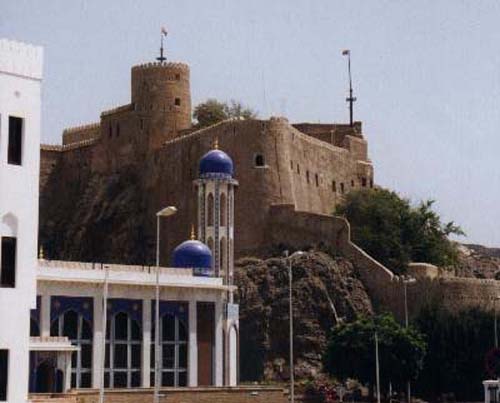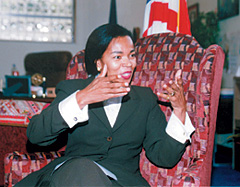March 1, 2004 - Arab News: Oman RPCV Gina Abercrombie-Winstanley says Arab Women Should Not Give In to the Restrictions of Their Cultural Environment
Peace Corps Online:
Directory:
Oman:
Special Report: Diplomat and Oman RPCV Oman RPCV Gina Abercrombie-Winstanley:
March 1, 2004 - Arab News: Oman RPCV Gina Abercrombie-Winstanley says Arab Women Should Not Give In to the Restrictions of Their Cultural Environment
Oman RPCV Gina Abercrombie-Winstanley says Arab Women Should Not Give In to the Restrictions of Their Cultural Environment

Oman RPCV Gina Abercrombie-Winstanley says Arab Women Should Not Give In to the Restrictions of Their Cultural Environment
Arab Women Should Not Give In to the Restrictions of Their Cultural Environment
Khaled M. Batarfi, Al-Madinah, Gina Abercrombie-Winstanley
Gina Abercrombie-Winstanley, the US consul general in Jeddah, is an African-American woman and has experienced racial discrimination first-hand. But she overcame the obstacles that were put in her path, reaching senior positions in the National Security Council, the White House, the State Department and the UN, and finally the highest diplomatic post held by an African-American woman in the Middle East. To coincide with American black history month, she told Al-Madinah newspaper her story:
I was born in 1957 at a time blacks had few civil rights in America. The first civil rights law that gave blacks equal rights to the whites was issued in 1957 .
My father was a lawyer, a university graduate, and my mother was a secretary with a high school diploma. Both qualifications were an achievement for them as African-Americans in the 1940's. They made sure I got the education I needed to progress in life because education was and still is the key to progress in America, especially for minorities and those with limited income and limited connections. Perhaps that is the case in most modern societies.
When I was in high school, I decided to study Hebrew because I heard it spoken in my neighborhood in Ohio. I also participated in an exchange program in college. I went to Israel from 1978 to 1979 . This coincided with Egyptian President Anwar Sadatís visit to Jerusalem to build bridges of peace between Arabs and Israelis for the first time, and it was the beginning of a lifelong interest in the Middle East.
Being at the heart of events made me want to understand the nature of the conflict in the region, and through relations Iíve built with Arabs and Jews I have been able to gain a better understanding of the nature of the conflict and opportunities and ways to find a solution.

After this journey, I had the chance to go back to the region one other time: this time to a Gulf country. I volunteered to work in the Peace Corps. Itís an American organization that sends volunteers to developing countries for educational services in different sectors. You can imagine the negative reaction I got from some of my family and friends. Many of them could not imagine that someone would work without salary, but their misgivings evaporated in the face of my insistence and belief.
The reason for my interest in this organization started as a child, when I saw an ad that said, ďPeace Corps: The toughest job youíll ever love.Ē With pictures of volunteers working in developing countries, helping the people, I got hooked on the idea, and when the chance came I didnít hesitate.
The country I chose was Oman. That was my good fortune. In this beautiful country, I moved from village to village, from town to town, spreading health education and how to use antibiotics and medications for diseases after I received courses in this field back in America.
In Oman I got to know the Arab character and Omani women. I learned from them as much as they learned from me. In Oman, I met an Englishman, and despite cultural and racial differences in background, we got married and now have two lovely children. It was a wonderful time.
I got my BA from George Washington University and an MA from Johns Hopkins University. My studies included nuclear nonproliferation courses at a time when we were at the peak of the Cold War and international polarization. I applied to work for the State Department and I began a journey of personal meetings, exams, procedures, and finally I received my security clearance.
One of my best memories, when I recognized I had achieved something for myself, was my first day in the White House. I felt I was entering the house of American authority with all its history. I remember all the stories that were written in history books about the burning of the White House at the hands of the British and salvaging what could be salvaged from that fire and then its reconstruction.
I remembered all the great presidents who ruled this country from this place, those who walked the same corridors that I was in, and helped in the governance of my great country. I was overwhelmed with emotions and thoughts. Then I called my mother from my new office and I told her about this historic moment in my life and about my feelings. I worked for two sections of the National Security Council in the White House, as director for legislative affairs, and later for the Arabian Peninsula.
I started working for the State Department in 1985 . I had a choice between an easy job in London or a dangerous one in Baghdad. You might be surprised that I chose Baghdad, because the Iran-Iraq war in 1985 was at its peak. The Iranian missiles were hitting the capital. This wasnít the only problem. In addition, there was a shortage of food supplies and medicine. Our time was very difficult considering the oppressive nature of the regime and their secret police. Communicating with the Iraqis on the street was not easy, nor was movement in Iraq and between cities. Movement in the capital itself without escort from secret service and national security was impossible. The reason why I didnít choose London is because I know it. My in-laws live there and I frequently visited it. Baghdad was an adventure and an unknown world to me. I stayed there as Consul General for a year and a half before I was transferred to Jakarta and then to Cairo.
From Egypt to Washington, I worked for Deputy Assistant Secretary Lawrence Eagleburger for a year and a half. After a year of studying Arabic in Tunis, I worked in our embassy in Tel Aviv for three years, 1994 -97. I was responsible for reporting on Palestinian-Israeli relations and had the opportunity to meet Arafat many times. Then I went back to America to work as an advisor to the Ministry of Defense and the American mission to the UN. I also worked on the committee for international relations in Congress until 2001. I was then lucky enough to be chosen as US consul general in Jeddah.
My experience with Arab women has been diverse. Iíve was there when Omani women entered a new world through education and employment. I also lived through the Palestinian experience, which is more mature and developed, and the Tunisian and Egyptian experiences during my stay in these two countries

The most exciting to witness were the Iraqi women. I was surprised when I learned that Iraq had a female ambassador before America did. (She was appointed in the 1920's.) I witnessed the scientific and practical progress that the Iraqi women achieved although they were living under the Saddam Hussein regime. Despite the limited chances to meet with Iraqi women, I saw how they fulfilled their complete role in society, at school and university and in private and public services, how they achieved their goals and proved themselves in society ó especially during the Iraq-Iran war when they took the place of men in many places.
I still remember my surprise when I visited Riyadh as a White House official a few years back and I stayed there for three days, during which I saw only one Saudi woman. But my current experience has improved the picture.
I have been able to meet a large number of the best women in your country who work in different fields, private and public, and I was pleased to hear of their achievements. I think they have a long road ahead to achieve their goals and effectively participate in the development of their country. I honor their achievement. I would never have achieved what I did without the opportunities provided by my government and the support of others.
Itís difficult for me to say what it has been like to be a black woman in a world dominated by white men, especially when most of the challenges have become a part of the past. But we cannot ignore that women and minorities in America have faced enormous challenges in the past. I personally have had many difficulties and I have been looked down on by colleagues at different stages of my life.
But I refuse to give up, and I challenge them, and I insist on my rights as a woman and as an African-American to be treated as equal to others. I try to give my experience to the Arab women and ask them not to give in to the restrictions of the cultural environment. They should equip themselves with knowledge, self-confidence and insistence on self-achievement. This is how they can contribute to their country in whatever way they choose.
About the Author

Gina Abercrombie-Winstanley joined the Foreign Service in 1985 and served as Consul in Baghdad, before being posted to Jakarta and Cairo. She then served as Special Assistant for Middle Eastern and African Affairs to Deputy, and later Secretary of State Lawrence Eagleburger. After a year of advanced Arabic, she served as Political Officer at the Embassy in Tel Aviv with responsibility for the Gaza Strip. Before her current posting as Consul General in Jeddah, Saudi Arabia, she was Policy Advisor to the Director of the Near East Ė South Asia Center for Strategic Studies at the Department of Defense, Senior Advisor for Middle Eastern Affairs at USUN, Director for Near East South Asian Affairs with responsibility for the Arabian Peninsula at the National Security Council of the White House and Director for Legislative Affairs, also at the NSC. Prior to that, she was awarded a Pearson fellowship and worked on the Senate Foreign Relations Committee for the Ranking Member, Senator Joseph Biden.
Ms. Abercrombie Winstanley has a Bachelors degree from George Washington University and a Masters degree from Johns Hopkins University and is a member of the Council of Foreign Relations. She is married and has two children.

Some postings on Peace Corps Online are provided to the individual members of this group without permission of the copyright owner for the non-profit purposes of criticism, comment, education, scholarship, and research under the "Fair Use" provisions of U.S. Government copyright laws and they may not be distributed further without permission of the copyright owner. Peace Corps Online does not vouch for the accuracy of the content of the postings, which is the sole responsibility of the copyright holder.
Story Source: Arab News
This story has been posted in the following forums: : Headlines; COS - Oman; Arab Issues; Women's Issues; Diplomacy
PCOL10329
09
.
i served in peace corps fiji and experienced friend ships with many women who were musslim and of decent from the areas of pakistan i am now married to an arab from the middle east and can share cultural thooughts with other
How could 60,418,140 people be so stupid?
http://www.geocities.com/marc_lawrence@sbcglobal.net/fu.gif
How could 60,418,140 people be so stupid?
http://www.geocities.com/marc_lawrence@sbcglobal.net/fu.gif
If there is a god no man or religious leader speaks for him.
It is time to crusade for peace not for religious beliefs.
I want to go to the Middle East and willingly give my life by walking into the war zone with a placarded saying:
There are no martyrs only murderers.
Listen to your hearts not to the words of Religious leaders or politicians. The leaders of America, Israel or Islam do not have the answers they are just people no better or knowledgeable than you or I. You give them the power they have over you
For the sake of your children and all the other human beings around you too scared to speak out - Refuse to co-operate with the people who say violence or revenge is a solution - The dead and the grieving know they are wrong.
Please join me, go to the Middle East, offer your life and show the leaders of any conflict that what ever justification for killing others they have - they are wrong.
The religious, ethnic, political or cultural differences between us have no value when compared to the murder of a Father, Mother, Son, Daughter, Brother, Sister, Grand Parent, Aunt or Uncle.
If we do not do something now then people with the power to frighten us will always cause us death and suffering.





